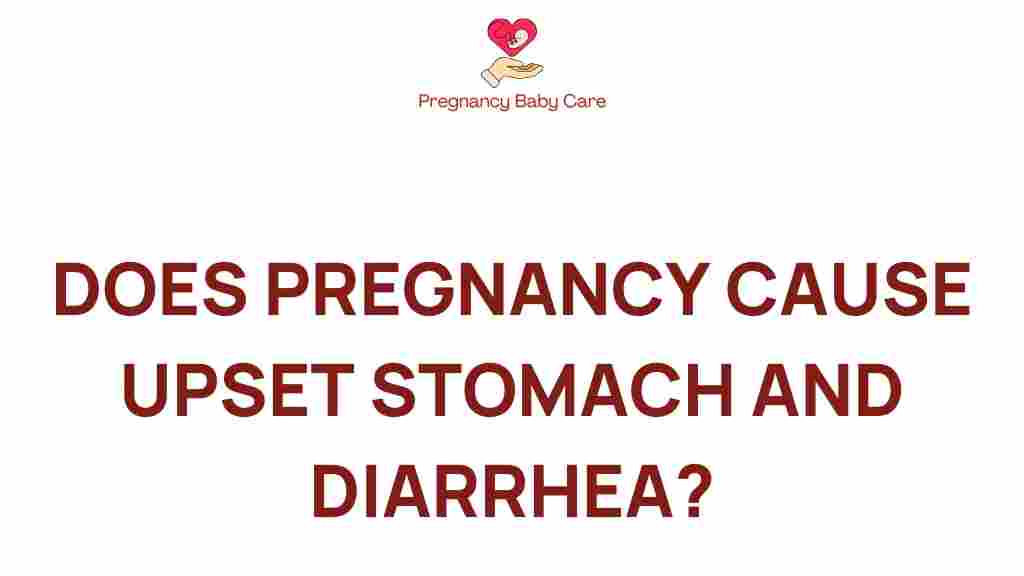Unraveling the Truth: Does Pregnancy Cause Upset Stomach and Diarrhea?
Pregnancy is a time of incredible change and anticipation for expectant mothers, but it can also bring about various health challenges. One common issue that many women report during pregnancy is an upset stomach, sometimes accompanied by diarrhea. Understanding the symptoms, causes, and solutions for digestive issues during this crucial period is vital for maternal health and overall well-being. In this article, we will explore whether pregnancy truly causes upset stomach and diarrhea, the underlying factors, and steps to alleviate these concerns.
Understanding the Symptoms of Digestive Issues in Pregnancy
During pregnancy, many women experience a range of digestive symptoms that can be uncomfortable. Common symptoms include:
- Upset stomach: This may include nausea, bloating, and general discomfort.
- Diarrhea: Frequent, loose, or watery stools that can lead to dehydration.
- Constipation: Some expectant mothers may experience the opposite, feeling bloated and unable to pass stools.
- Heartburn: A burning sensation in the chest due to acid reflux.
Understanding these symptoms is crucial for expectant mothers to differentiate between normal pregnancy experiences and potential health concerns. Recognizing the signs early can help in seeking appropriate prenatal care.
Causes of Upset Stomach and Diarrhea During Pregnancy
Several factors can contribute to an upset stomach and diarrhea during pregnancy:
- Hormonal Changes: The surge in hormones, particularly progesterone, can slow down digestion and lead to discomfort.
- Dietary Changes: Expectant mothers often change their diets, which can include new foods that may upset the stomach.
- Stress and Anxiety: The emotional rollercoaster of pregnancy can trigger digestive issues.
- Infections: Gastrointestinal infections can occur, leading to diarrhea and other symptoms.
- Food Sensitivities: Some women may develop sensitivities to certain foods during pregnancy.
It is essential to track when these symptoms occur and consult a healthcare provider if they persist or worsen.
Step-by-Step Guide to Managing Digestive Issues During Pregnancy
If you’re an expectant mother dealing with an upset stomach or diarrhea, here’s a step-by-step approach to manage these symptoms:
Step 1: Monitor Your Symptoms
Keep a journal of your symptoms, noting:
- When the symptoms occur
- What you’ve eaten
- Your stress levels
- Any other accompanying symptoms
Step 2: Adjust Your Diet
Consider making dietary changes, such as:
- Eating smaller, more frequent meals.
- Avoiding spicy, greasy, or overly rich foods.
- Incorporating bland foods like bananas, rice, applesauce, and toast (BRAT diet).
Step 3: Stay Hydrated
Dehydration can be a concern with diarrhea. Ensure you drink plenty of fluids, opting for:
- Water
- Clear broths
- Electrolyte solutions
Step 4: Manage Stress
Engage in relaxation techniques such as:
- Meditation
- Yoga
- Deep breathing exercises
Step 5: Consult Your Healthcare Provider
If symptoms persist or worsen, it’s crucial to seek professional advice. Your healthcare provider can offer personalized guidance and ensure your health and that of your baby.
When to Seek Medical Attention
While mild digestive issues can be common during pregnancy, certain situations warrant immediate medical attention:
- Severe abdominal pain or cramping
- Persistent vomiting or diarrhea lasting more than 24 hours
- Signs of dehydration, such as dizziness or decreased urination
- Fever or chills
Expectant mothers should always prioritize their health and seek prenatal care if any concerning symptoms arise.
Natural Remedies for Upset Stomach and Diarrhea
In addition to dietary adjustments and stress management, some natural remedies may help alleviate upset stomach and diarrhea:
- Ginger: Known for its anti-nausea properties, ginger can be consumed as tea or in candied form.
- Chamomile Tea: This can soothe the digestive tract and reduce inflammation.
- Probiotics: Incorporating probiotics through yogurt or supplements may help restore gut health.
Always consult your healthcare provider before trying new remedies, especially during pregnancy.
Importance of Prenatal Care for Maternal Health
Regular prenatal care is essential for monitoring both the mother’s and baby’s health. It provides an opportunity to discuss any issues, including digestive problems, with a healthcare professional. Regular check-ups can help catch potential complications early and ensure a healthy pregnancy.
Expectant mothers should never hesitate to voice their concerns or ask questions during prenatal visits. This proactive approach helps in maintaining maternal health and provides peace of mind.
Conclusion
In conclusion, while an upset stomach and diarrhea can be common during pregnancy, they can often be managed with lifestyle and dietary adjustments. Understanding the symptoms, causes, and when to seek medical attention is crucial for the health of both the mother and the baby. Expectant mothers should prioritize their health by maintaining regular prenatal care and addressing any digestive issues promptly.
For more information on prenatal care and managing pregnancy symptoms, visit this resource. Remember, a healthy pregnancy leads to a healthy baby, and taking care of your digestive health is an important part of the journey.
By being informed and proactive, expectant mothers can navigate the challenges of pregnancy with confidence, ensuring a smoother path to motherhood.
This article is in the category Health and created by PregnancyBabyCare Team
